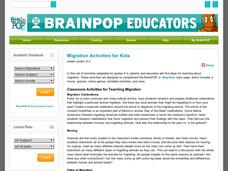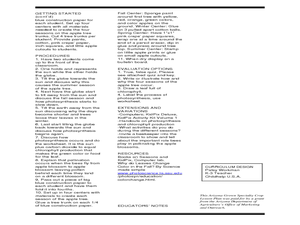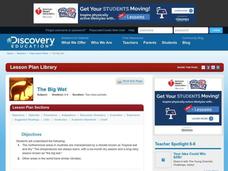Curated OER
Reasons for the Seasons
Middle schoolers discover how the Earth's axis of rotation affects the angle of sunlight and the length of day. They take a survey and give the survey out to family members and friends. They tally their findings and then determine the...
Curated OER
Seasons
Students listen to stories about the seasons, and discuss the kinds of clothing people wear for each season. They take a walk, collecting items to go with each season, then draw pictures to match the season.
Curated OER
Seasons
Students explore the four seasons. Through observation activities, they explore and discuss the weather changes that occur during each season. Students create a graph of the clothing that is worn during each season.
Curated OER
Classroom Meteorologists: An Experiential Approach to Learning about Seasons and Weather
Students examine several concepts about weather in the seven lessons of this unit. This year long activity helps students to gather data seasonally about wind, clouds, precipitation, and temperature. Earth's three climate zones are...
Odyssey of the Mind
Odyssey of the Mind Curriculum Activity: From a Distance
Challenge your class with an amazing set of ideas that really put the project back into project-based learning. It all starts with a whole class research task. Each learner will look up and take notes on multiple facets of things that...
Berkshire Museum
Reduce, Reuse, and Recycle: Sorting Through Personal Choices
Raise children's awareness about the importance of conservation with this hands-on science lesson. Start by breaking the class into groups and having them collect trash from around the school or local park. Students then use the provided...
Curated OER
Charting Seasonal Changes
Students research the Earth's patterns of rotation and revolution, create a chart and graph of these patterns and use them to explain the causes of night and day and summer and winter.
Maine Math & Science Alliance
Earth as a System
Ecosystem, human body system, weather system. We hear the word system a lot, but what does it really mean? In the activity, pairs or groups of learners discuss how a bicycle is a system and then analyze objects in their classroom and...
Curated OER
The Earth's Atmosphere and Temperature
Students describe and compare the layers of the atmosphere. They explain how to measure the temperature of the atmosphere and discover what causes the atmosphere to heat up in some places more than in others.
Curated OER
Using Newsprint as a UV Detector
Middle schoolers investigate the effects of UV radiation. In this earth science lesson, students explain how the time of day relate to UV abundance on Earth. They determine if weather affects the amount of UV that Earth receives.
Curated OER
Redesign the Rover: Mars Research Year-Round
Students discuss the solar system, the planets, periods of orbit and revolution. For this space lesson students discuss the importance of the study of Mars and brainstorm ideas on how NASA might solve its Rover design problem.
BrainPOP
Migration Activities for Kids
For as long as there has been life on earth, animals, including humans, have used migration as a means of survival. This collection of activities supports young scientists as they learn about this behavioral adaptation, encouraging them...
Curated OER
A Pressing Project
Students create a collection of pressed plants. In this plant lesson, students use newspaper, plywood, and a rubberband to press plants they previously collected.
Curated OER
Classifying Plants and Insects
Art and science come together in a instructional activity based on Flower Still Life by Ambrosius Bosschaert the Elder. Learners classify plants and insects in the painting by color, leaf shape, size, reproduction, and season of bloom.
Curated OER
Apple: Bare to Pick
Students investigate the seasons of the apple tree. In tree seasons lesson, students use a sun model and a globe to study the tilt of the Earth to create the seasons. Students discuss the tilt and the seasons. Students discuss...
Curated OER
Mars Calendar Project
Learners design a calendar that displays time on Mars. They explore the differences between time on Earth and time on Mars while making the calendar.
Curated OER
Harvesting Water from Fog
Students analyze the water issues of Cape Verde in the Peace Corp lesson. In this water resources lesson, students analyze the concept of water being harvested from fog. Students explore the Peace Corps project site by watching Nathan...
Curated OER
Learning Lesson: The Shadow Knows I
Students examine the elevation of the sun to discover the changes in seasons. They observe and measure the length of their shadow. They compare this measurement to one taken four months later.
Curated OER
Science Videos
Students plan, practice, and act in a 2-3 minute videotaped production about a specific topic. Students from a local high school give presentations pertaining to seasons, earth rotation, and moon phases. Students analyze the...
Curated OER
The Sun in Our Lives
Third graders identify the different parts of the sun. In this astronomy lesson, 3rd graders examine how the sun's energy drive life processes on Earth. They construct a model of a solar system using large rolls of toilet paper.
Curated OER
The Big Wet
Students complete a research project. For this climate lesson, students learn about the climate "tropical wet and dry" found in Australia. Students work in groups to research aspects of this climate and then create a class presentation.
Curated OER
Natural Features of Our Community
Second graders read about and discuss natural features of communities. They listen to a guest speaker, such as a park ranger to expand their knowledge of natural features. They go on a field trip, if possible, to a local zoo or...
Curated OER
Hand And Foot Print Reindeer
Students create reindeer out of paper cut-outs of their own hands and feet in this fun and quick Art activity for the early-elementary classroom. The lesson may be accomplished as an individual or small group (partner) project.
National External Diploma Program Council
Capitalization Review
Using correct grammar is a capital idea! Elementary readers review the rules of capitalization, including proper nouns, abbreviations of organizations, and holidays, before correcting the errors in two sets of sentences.

























